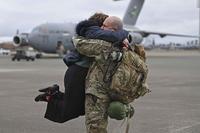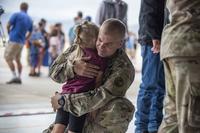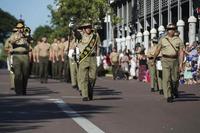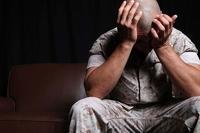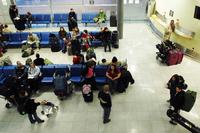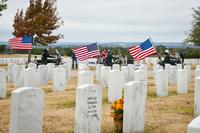Getting a good night's rest is critical to daily performance whether you're sitting behind a desk or patrolling the desert. For servicemembers, veterans, and their loved ones, not getting enough sleep can negatively impact weight, mood, and conditions like PTSD. Whether you're deployed or waiting for someone who is, taking a hard look at your quality and quantity of sleep can help you endure tough situations.
FALLS CHURCH, Va. -- Going without sleep can make Soldiers feel more than just a little grumpy and groggy at work, said a sleep medicine consultant on the Army's Performance Triad program. "Sleep deprivation, especially over a long period of time, can have medical consequences that include depression and even exacerbate the symptoms of post-traumatic stress disorder" if a Soldier has experienced a stressful event in the past, said Col. William Frey. Frey spoke Aug. 8, 2013, at the Army Medical Department in Falls Church, Va., during Army Medical Command's first "Stand Up for Health Training Day," which focused on the Army's Ready and Resilient Program's Performance Triad. The Performance Triad consists of three things essential to Soldiers' good health, emotional well-being and performance. Those three things include activity, nutrition and sleep. Lack of sleep or poor quality sleep can have a host of negative consequences, Frey said. Those range from weight gain and decreased cognitive performance to poor interactions with family and coworkers, and an increased likelihood for accidents. In the case of weight gain, there is some evidence those who don't get enough sleep tend to stay up late at night watching TV and eating junk food, he said. Ironically, health care providers are themselves more often than not prone to sleep deprivation. The New England Journal of Medicine published a study on the work schedule of medical interns who worked long hours, he said. Results indicated that their lack of sleep resulted in some serious medical errors. Quality is as Important as Quantity A general rule of thumb is that adults require about seven or eight hours of sleep a day, children 10 or more depending on their age, he said. Although a lot of people say they can get by on six hours or less, their performance and health is most likely being affected even if they don't realize it, he said. There is maybe just one or two percent of the population who don't seem to be as much affected by six hours or less of sleep over an extended period of time. But it isn't just getting seven or eight hours of sleep; it's the quality of that sleep that is just as important. Restless sleep can be caused by consuming a nightcap or two before bedtime, requiring trips to the bathroom in the middle of the night, he said. Caffeine is also a culprit in restless sleep. Frey recommends not consuming coffee, chocolate or tea within six or seven hours of sleeping. And, eating a big meal right before bedtime is not a good idea either, he said. Rather it's best to space meals out, having a snack or light meal every four to five waking hours, the same advice given by Army nutrition experts. Besides fitful sleep, there are other kinds of sleep disorders. Obstructive sleep apnea can be especially troubling for someone who notices their bed companion has stopped breathing, he said. It is relatively common, affecting roughly 25 percent of men and 10 percent of women over the age of 30. While it has a genetic component, it also is more prevalent in people who are obese, again showing the inter-relationships of the Performance Triad, he said, in this case, nutrition and sleep. Other types of sleep disorders include narcolepsy, insomnia, sleep walking, snoring and nightmares. These and other sleep disorders not only affect Soldiers' health, but also their level of readiness. Frey suggests Soldiers visit their installation medical treatment facility or sleep disorder center if they suspect having a sleep disorder. However, Frey said most sleep problems can be remedied through behavioral changes, not by taking a sleeping pill or other medication, unless prescribed by a doctor. There are three simple things anyone can do to get a good night's sleep that don't entail spending an exorbitant amount of money for a luxury bed, he said. Controlling light, noise and temperature can work wonders, he said, noting that when Soldiers are on travel orders or deployed, that isn't always possible. Another tip is to turn the bedroom clock around so you don't focus on what time it is, he said. Clock watchers tend to have more anxiety and get less sleep since they're waking up periodically to see how much time they have left before they have to get up. Also, the bedroom should be reserved as a place for sleep or intimacy, he said. It should not be a place to watch TV, play computer games, argue or read. Although these are general guidelines, it is understood that Soldiers cannot always follow them to a T, as mission sometimes dictates going without sleep or having interrupted sleep, such as manning a security post at night. It's just part of Army life, he said. It is however important for leaders to include time for quality sleep in their operation plans and consider "resupply" of sleep just as important as ammunition, food and water. But whenever possible, he said, getting a good quality sleep will not only benefit Soldiers and those around them; it will also improve their military readiness.


